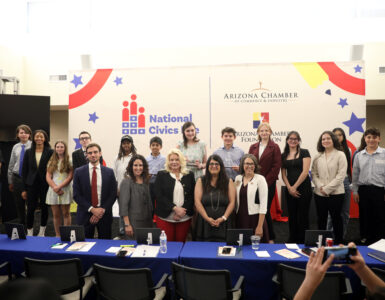On Tuesday, Governor Doug Ducey discussed the state’s efforts to combat suicide and ramp up behavioral health resources in schools and rural communities.
“I wanted to give an overview of suicide in Arizona,” Governor Ducey said. “This is affecting all of our communities, from the elderly to our young people, our veterans, and so many more – no one in our state is immune to this tragedy.”
Between 2006 and 2016, the suicide rate in Arizona – as well as the nation – increased, according to the Arizona Department of Health Services. Unfortunately, the state has seen the suicide rate climb from 15.4 to 17.7 percent in that span of time, bringing the state above the national average of 13.4 percent.
Veterans, in particular, have experienced declining mental health since 2006; both the total number and the proportion of veteran suicides have increased in that timeframe. In fact, in 2017, the suicide rate among Arizona veterans was 19 percent higher than non-veterans.
“We have focused on these fronts and we’ve made some great progress in the right direction as of late,” Ducey said. “This year, I was proud to sign the Mitch Warnock Act to support suicide awareness and prevention training in our public schools. This year’s budget also provides one million dollars for the ‘Be Connected’ program to prevent veteran suicide and get veterans connected to the critical services they need.”
The Mitch Warnock Act, signed in May, requires teachers in grades six through twelve be trained in suicide warning recognition and prevention. The law will take effect in 2020, giving schools time to prepare the trainings.
Rural counties in Arizona are at the highest-risk for suicide, especially among their younger populations. Yavapai, Gila, Navajo, Apache, and La Paz County all witnessed suicide rates above 30 percent in 2017. In fact, rural communities have a suicide rate (30.6 percent) almost twice as high as urban communities (15.7 percent).
“We’ve also expanded Arizona’s telemedicine program to help get much-needed health services to our rural and outlying areas,” Ducey said.
Last year’s state budget included $3 million to provide behavioral health services for eligible students. Currently, these programs serve over 40 school districts and over 6,000 children, and the Governor’s Office has meetings scheduled with schools in Flagstaff and Tucson to expand the services.
“Lastly, I want to mention that we’re working to make sure that law enforcement has the tools to ensure that people who are an immediate threat to themselves or others get evaluated as needed and don’t have access to firearms – we call it the Severe Threat Order of Protection, or STOP order,” Governor Ducey said. “The issues of mental health and gun violence is something Arizona wants to be proactive on rather than reactive, and STOP orders are a tool to do that.”
In 2017, Arizona firearms were the leading mechanism of suicide among both males and females. Among both populations, firearms were the cause of 60.3 percent of all suicides; the STOP order is designed to diminish that percentage.
“We all know that we’ve lost far too many of our citizens to suicide, our entire state faces challenges in combating this issue, and our efforts are only just beginning,” Governor Ducey said. “So we’re going to continue working to ensure our rural communities have access to the care and resources they need to prevent and end suicide.”
















Add comment